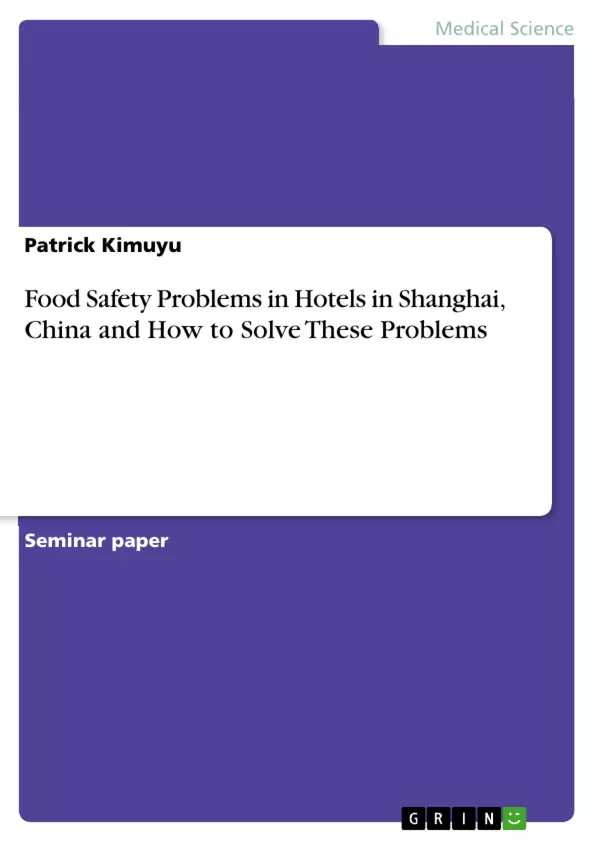In the recent years, food safety in Shanghai, China has become an enormous public health problem. Hotels in Eastern China have increasingly been associated with food safety issues such as food poisoning, contamination and unhealthy food ingredients which have cost the region its popularity in the hospitality industry. Shanghai is situated strategically on the Eastern region of China; thus, making it a preferred destination for international tourists. In addition, the city hosts a large number of industries. As such, it has a considerably a large population compared to other cities in the region. It is also known for its heterogeneous population comprising of tourists and foreign workers, as well as, entrepreneurs from foreign countries. It is believed that its strategic location has enabled it to achieve a competitive advantage in the production and hospitality industries because it serves as a gateway into the other East Asian countries and the Pacific region (Lau et al., 2013).
It is believed that the enormous population in Shanghai has always been the anchor of the hospitality industry in which hotels and restaurants experience an immense demand of food reserves from the population. This is probably the reason as to why multinational investors have established hotels and restaurants in the region to harness the benefits of the large client base, primarily in Shanghai city.
However, food safety problems seem to have exerted an undesirable impact on the progress of the hospitality industry. For instance, the increasing cases of food poisoning and industrial pollution of the environment have caused unprecedented outcry from the tourists and investors in the hotel industry. Therefore, this research paper will discuss food safety problems in Shanghai. It will also discuss several solutions to the food safety problems which have impacted negatively on the hotel industry in Shanghai and its environs, owing to the dangers of unhealthy foods.
Inhaltsverzeichnis (Table of Contents)
- Introduction
- Food Safety Problems
- Food Poisoning
- Industrial Contamination
- Processed Foods
- Solutions to Food Safety Problems
- Policy Framework
- Advisory Services
- Improved Hotel Management
Zielsetzung und Themenschwerpunkte (Objectives and Key Themes)
This research paper examines the pressing issue of food safety problems in Shanghai, China, specifically within the hotel industry. It aims to provide a comprehensive understanding of the various food safety challenges faced by hotels in Shanghai and explore potential solutions to address these concerns.
- Food Poisoning
- Industrial Contamination
- Processed Foods
- Policy Framework for Food Safety
- Advisory Services for Tourists
Zusammenfassung der Kapitel (Chapter Summaries)
The introduction highlights the growing concern over food safety in Shanghai and its impact on the hospitality industry. It emphasizes the city's strategic location, large population, and the challenges posed by food safety issues.
The section "Food Safety Problems" delves into the major concerns, including food poisoning, industrial contamination, and the use of processed foods in hotels. The chapter on food poisoning discusses the role of animal products and bacteria contamination in causing food poisoning, particularly highlighting Clostridium bacteria and botulinism disease.
Industrial contamination is examined as a significant contributor to food safety concerns. The chapter discusses the role of industrial pollution in contaminating water sources, leading to harmful chemicals being ingested through seafood and other aquatic animals consumed by the local population.
The chapter on processed foods highlights the prevalence of processed food products in hotels and the associated health risks. It discusses the potential dangers of processed milk and pork products containing high levels of sugars, salt, and harmful proteins.
Schlüsselwörter (Keywords)
The primary focus of this work is food safety in Shanghai, with a particular emphasis on the hotel industry. Key themes include food poisoning, industrial contamination, processed foods, and potential solutions through policy frameworks, advisory services, and improved hotel management. The paper explores the challenges posed by food safety issues and emphasizes the need for effective strategies to enhance food safety practices and protect both locals and tourists from health risks.
Frequently Asked Questions
What are the primary food safety concerns in Shanghai's hotels?
The main concerns include food poisoning caused by bacteria, industrial contamination of water and food sources, and the health risks associated with highly processed food ingredients like processed pork and milk.
How does industrial pollution affect food safety in Shanghai?
Industrial pollution contaminates local water sources. This leads to harmful chemicals and heavy metals being ingested by seafood and aquatic animals, which are then served in hotels and restaurants, posing a risk to consumers.
What specific bacteria are linked to food poisoning in the region?
The research highlights Clostridium bacteria as a significant threat, which can lead to serious conditions such as botulism, often linked to improperly handled animal products.
Why is Shanghai particularly vulnerable to food safety issues?
Shanghai has a massive, heterogeneous population and is a major industrial hub. The high demand for food reserves and the proximity of industrial zones to food production areas increase the likelihood of contamination and safety lapses.
What solutions are proposed to improve food safety in hotels?
Proposed solutions include strengthening the legal policy framework for food safety, providing advisory services for international tourists, and implementing stricter management practices within hotels to monitor ingredients and hygiene.
What is the impact of food safety problems on Shanghai's hospitality industry?
Food safety issues have caused an outcry from tourists and investors, potentially damaging the region's reputation as a top destination for international travel and business.
- Citation du texte
- Patrick Kimuyu (Auteur), 2016, Food Safety Problems in Hotels in Shanghai, China and How to Solve These Problems, Munich, GRIN Verlag, https://www.grin.com/document/381243



